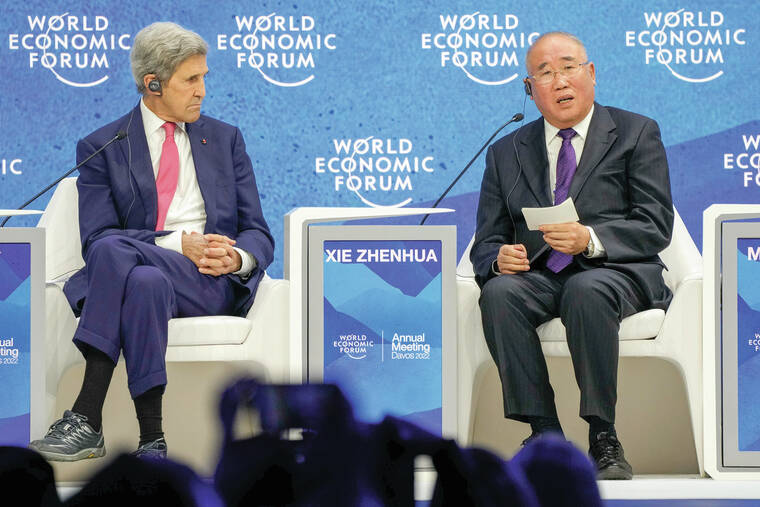Kerry and Xie exit roles that defined generation of climate action
The United Nations climate summit in Dubai was wrapping up last month when John Kerry went to a meeting with his Chinese counterpart Xie Zhenhua only to find a surprise waiting for him. Xie’s 8-year-old grandson had brought Kerry a card for his 80th birthday.
The lanky American, who had signed the landmark Paris climate accord with his granddaughter on his knee almost a decade earlier, bent down to thank the boy and praise his grandfather, according to someone who described the private encounter on the condition of anonymity.
ADVERTISING
Just how overheated a planet those two grandchildren half a world apart will inherit has hinged in part on the unusually warm bond between Kerry and Xie, whose relationship for the past decade and a half helped forge the globe’s stutter-step progress in curbing climate change. Xie, 74, retired in December, and Kerry recently announced that he’s stepping down soon.
It was a partnership that defined one generation’s hopes of saving a future one.
Over the years, Kerry and Xie forged a remarkable level of trust and respect in the world of international climate negotiations. They checked in on each other when they were sick, met each other’s families and spent long hours debating, quarreling and compromising in the fight against global warming.
The result was a series of agreements despite rising tensions between the U.S. and China that have even raised fears of war. Kerry and Xie paved the way for progress at international summits that could have otherwise stagnated. Their passports read like a history of modern climate negotiations — Copenhagen, Lima, Paris, Glasgow, Sunnylands, Beijing, Dubai and many stops in between.
Before the Paris deal, Earth was on a trajectory for about 3.5 degrees Celsius (6.3 degrees Fahrenheit) of warming over pre-industrial levels, scientists projected. Now Climate Action Tracker projects warming of 2.1 degrees (3.8 degrees Fahrenheit) — if world leaders follow through on their promises, that is.
However, even that level of warming may be catastrophic, and the departures of Kerry and Xie are reshuffling climate diplomacy at a moment when scientists warn that the move toward clean energy is still happening too slowly. Xie’s successor has been named, but it’s unclear what will happen with Kerry’s position.
“If the U.S. and China do not get along with each other, then global climate progress will be delayed,” said Li Shuo, an analyst at the Asia Society who previously worked with Greenpeace in Beijing. “It is imperative to kind of align these countries as much as possible if we want to achieve global climate progress.”
When Obama was reelected in 2012, he named Kerry secretary of state. Tackling climate change was a priority, and better relations with China was a key part of the strategy. The deadline was 2015, when the U.N. would hold a highly anticipated summit in Paris.
In 2014, Obama traveled to Beijing to announce a surprise bilateral agreement with President Xi Jinping. The U.S. set a more ambitious target for reducing emissions by 2025, while China promised to peak emissions by 2030.
Donald Trump was elected president in 2016, and he promptly withdrew the U.S. from the Paris agreement after taking office. Kerry and Xie stepped away from government service.
The hiatus lasted four years. When Joe Biden defeated Trump in 2020, he asked Kerry to serve as special envoy for climate negotiations.
Xi responded by calling Xie out of retirement, seen as a clear signal that Beijing was ready to work together again.
“If your president hadn’t wanted you to come back, I wouldn’t have come back either,” Xie told Kerry, according to a person who requested anonymity to discuss a private conversation. “I’ll be here roughly as long as you’re here.”
Their work culminated in November, when Kerry and Xie met at the Sunnylands resort in California. China agreed to include methane, a particularly potent greenhouse gas, as part of its emissions target.
The next month was their final U.N. summit in Dubai, which ended with a global agreement to transition away from fossil fuels. It was a better outcome than expected for a summit hosted by the oil-producing United Arab Emirates.


